In Bethlehem, Christmas traditions are spare and beautiful, and a star marks the birthplace of Jesus
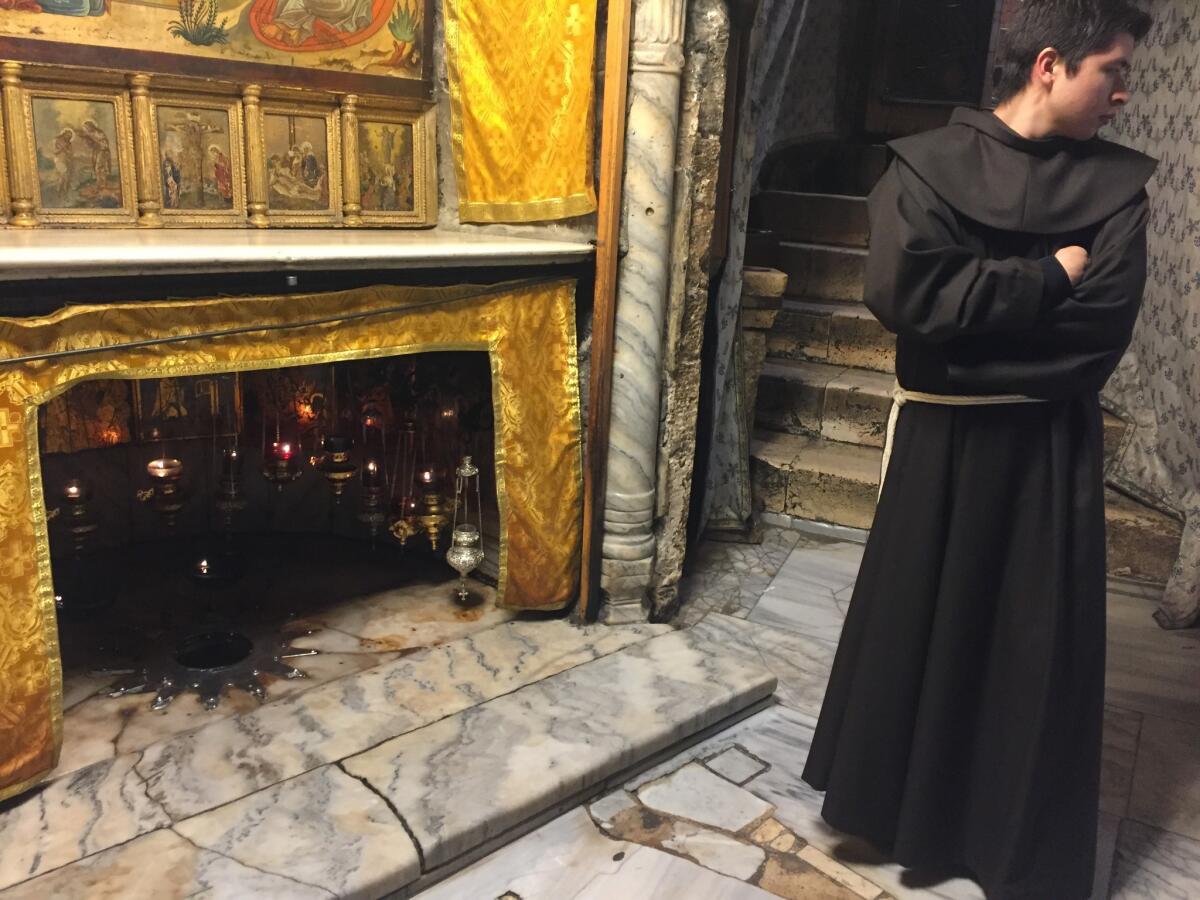
- Share via
Father Hanna Mass’ad had exactly 25 minutes to conduct dawn Mass in the grotto under the Church of the Nativity, which is believed to be the birthplace of Jesus.
It was the second of four services he’d conduct during the early morning hours of Christmas Day, as close as anyone can get to the place where, by tradition, Jesus alighted — a spot on the marble floor marked by a prominent brass star, overhung by bedrock.
While he celebrated the service in Arabic, in a sure tenor, occasional bystanders stopped, knelt and lay on the floor — overcome — to kiss the spot.
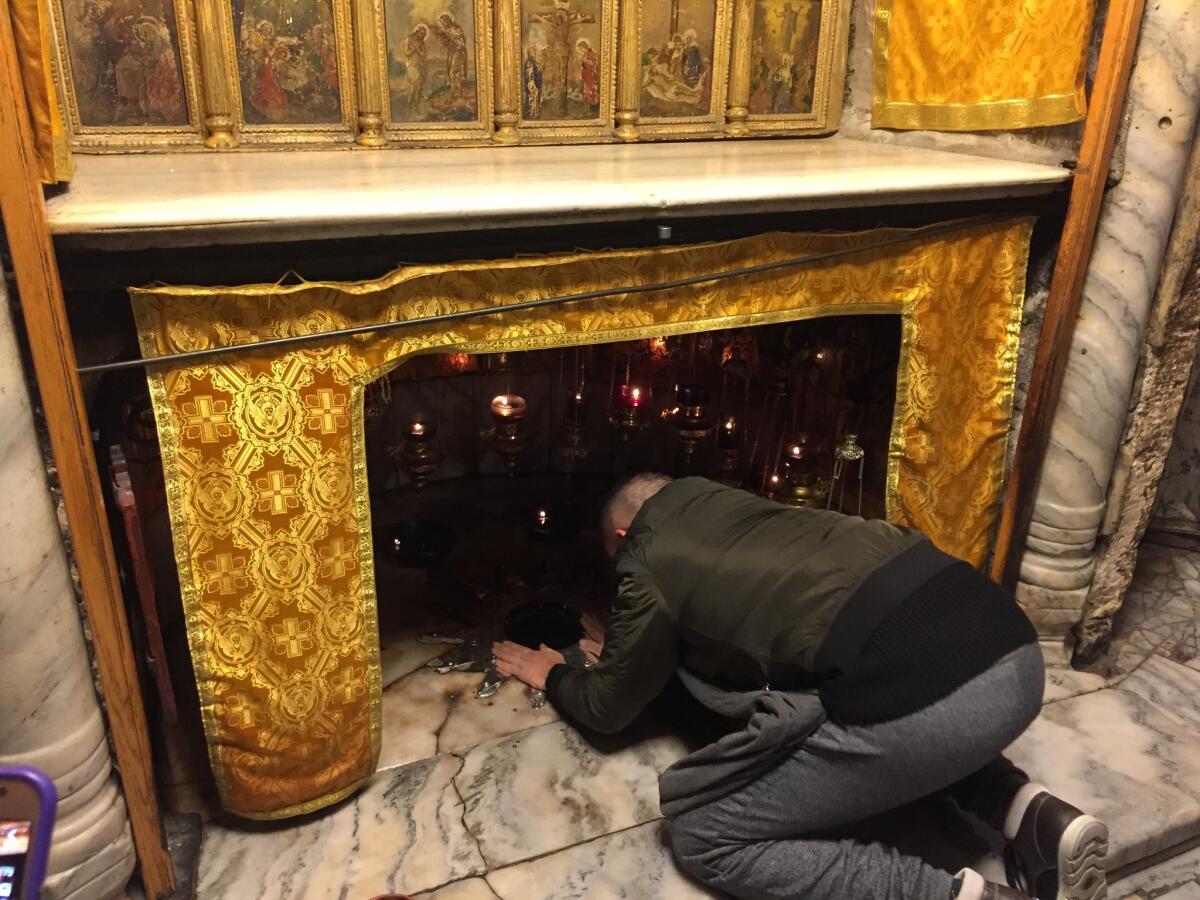
Christmas in Bethlehem is a spare, beautiful business. Like a sunrise in Hawaii, it is unaccompanied by any embellishment of common Yuletide fripperies like mistletoe or honey-roasted ham.
“We need old stuff sometimes,” wrote the late American poet Peter Kane Dufault in his most celebrated poem, “More Snow Falling.” “As in liturgy. Or a declaration of love. No frills, just infinity.”
That is Bethlehem.
Even the public midnight Mass, held outdoors when weather permits, is an austere, pious affair, though Xavier Abu Eid, a spokesman for the Palestinian government who attended Mass’ad’s service, dismissed it with a wave of his hand as “something for the cameras, you know. They ask if you’re with a VIP or some minister. Not here, though ministers sometimes come, quietly.”
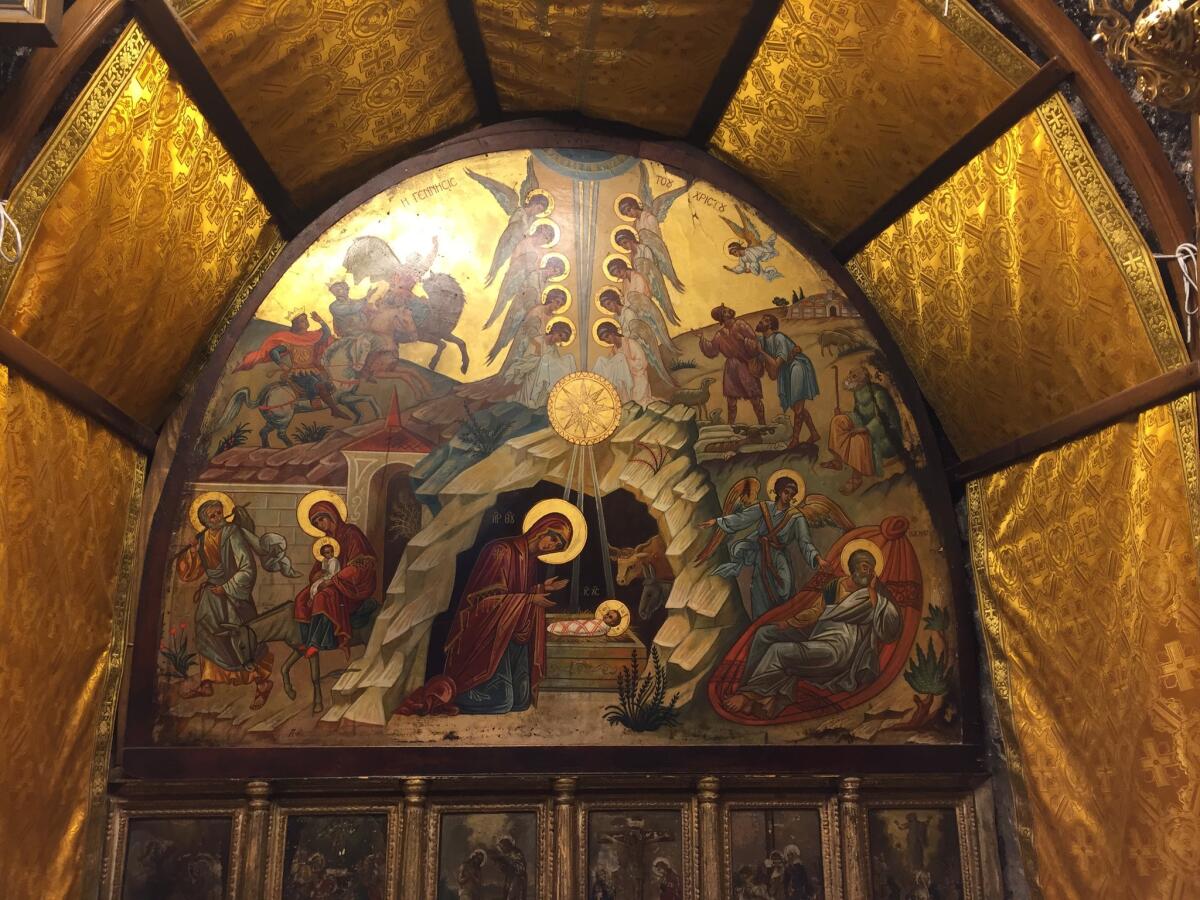
Mass’ad, the Catholic parish priest of Beit Jala, a village that lies between Jerusalem and Bethlehem, is a vigorous, sturdy man with twinkling eyes. His given name, Hanna, is Arabic for John. He attacked the task before him solemnly, seriously and purposefully. He does it every year.
The 25-minute limit is among many strictures, known as the status quo, that have reigned in this church for more than 150 years.
The rules are intended to govern the peace in a maze-like temple of prayer that is holy to Roman Catholic and eastern Orthodox churches. The status quo, overseen by a strict Franciscan brother from Poland, determines even upon which tile of ancient marble flooring a priest may tread.
Mass’ad’s service started a few minutes late, at 5:08 a.m., and the Orthodox sacrament was scheduled to start at 5:30.
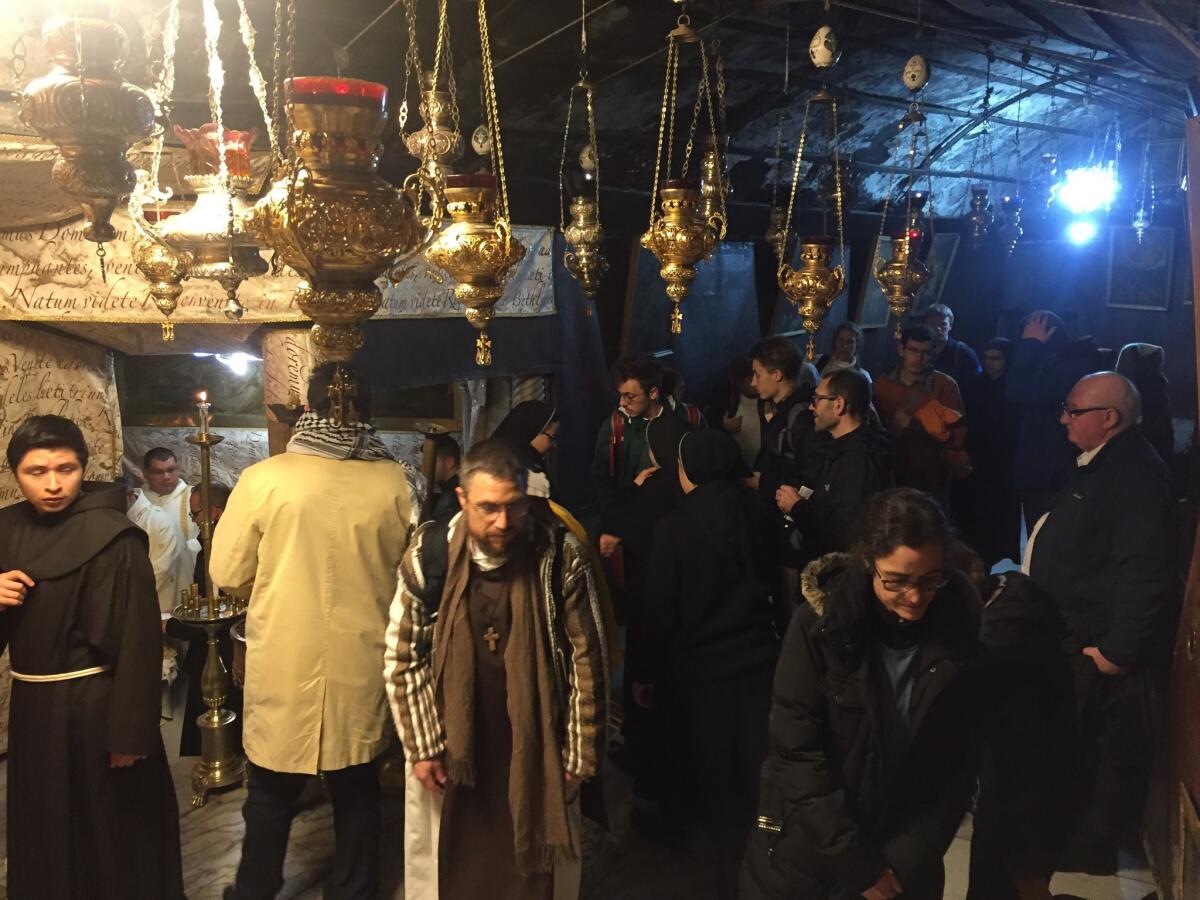
“Amen,” repeated the small flock, which included two assistants, four nuns and half a dozen or so lay worshipers. No one peered into a cellphone or tugged at a relative’s coat.
At such an early hour, no children were to be seen.
“Bi’ism al’ab, wal’iben, wal roh alqodos,” the young priest intoned in Arabic. “In the name of the Father, the Son and the Holy Spirit.”
While Mass’ad celebrated Mass, the call of the Muslim muezzin sliced through the clean, dark air of Manger Square, awaking birds nestled in the darkened Christmas tree and drawing the attention of 150 German pilgrims who’d arrived from Jerusalem’s Dormition Abbey. They carried a scroll upon which were written the names of thousands of people unable to be in Bethlehem for Christmas, and who had asked the Benedictine order to pray for them.
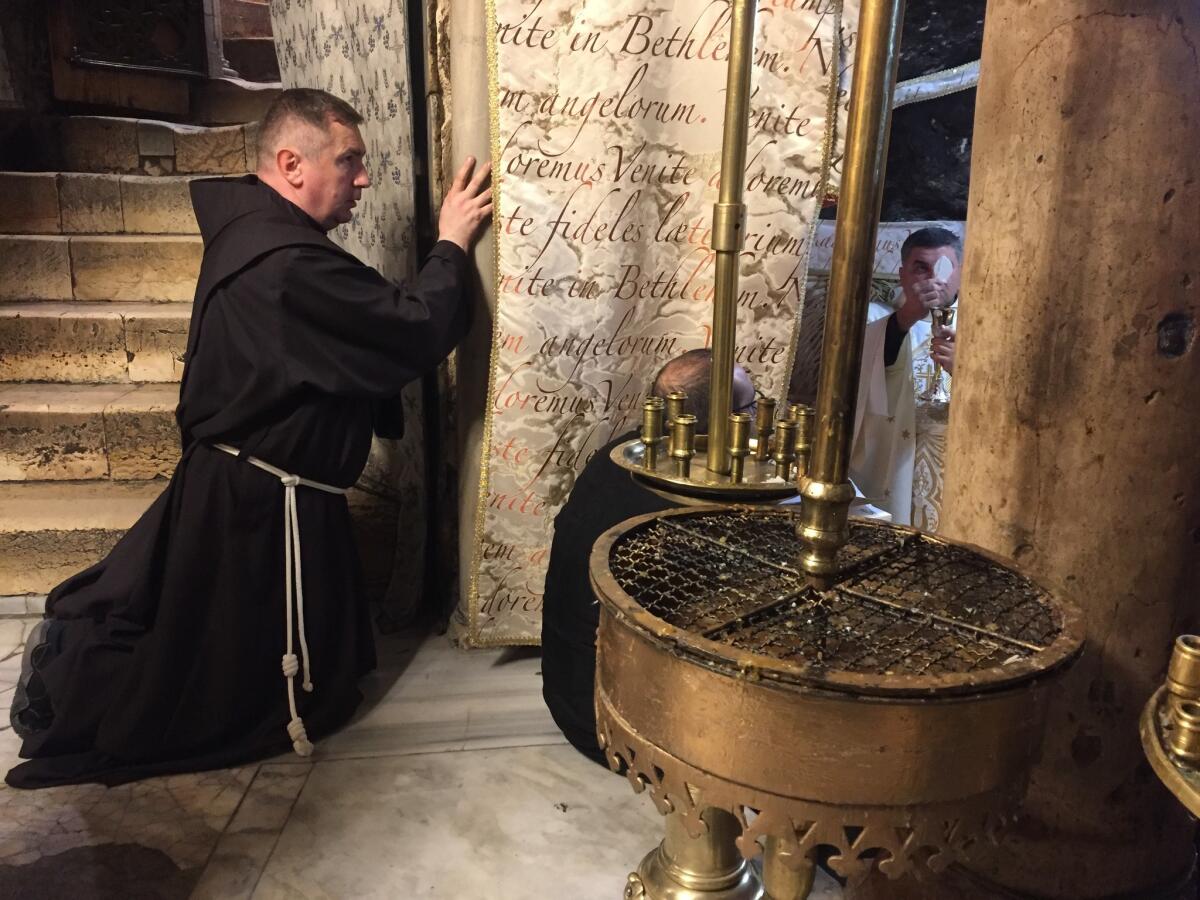
Above the grotto, in the main basilica, a Christmas Mass in Urdu was attended mostly by Indian foreign workers employed in Israel, across the security barrier from Bethlehem, and by people who appeared to be European and African pilgrims unperturbed by the foreign language.
Outside, in the pitch dark, Palestinian police Officer Mahmoud Ismail reported with satisfaction that Christmas was proceeding without a single incident. A street cleaner named Mohammad greeted the officer while sweeping the drenched square. Bethlehem is about 13% Christian, with the rest of its inhabitants Muslim. Christmas brought with it this year the first rain of the season after months of drought.
Israel and the Palestinian territories have been focused in recent weeks on President Trump’s declaration that the United States recognizes Jerusalem as the capital of Israel. But that seemed to be well in the background on Christmas morning.
The only allusion to the United States came from an enterprising shop owner who, mistaking the pale German pilgrims for Russians, called out to them with a cheery “Rusia kharasho! Amrika kaput!” which, in a blend of Arabic, Russian and German, means: “Russia is good. America is broken!”
Changing quickly into his black cassock following the Mass, Mass’ad followed Abu Eid into his car, where the two headed to buy crackling hot ka’ek, a sesame encrusted long bagel, and then to the next Mass, at 7 a.m. sharp, in the parish church.
Tarnopolsky is a special correspondent.
Sign up for Essential California
The most important California stories and recommendations in your inbox every morning.
You may occasionally receive promotional content from the Los Angeles Times.







